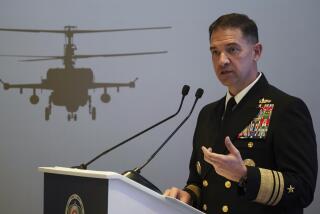PERSPECTIVE ON THE PERSIAN GULF : A U.N. Navy for a U.N. Mission : A virtually all-American armada neutralizes our success elsewhere in internationalizing the containment of Iraq.
- Share via
Legitimate American interests in the affairs of the Persian Gulf region have involved us in an intense battle of ideology, influence and wills. In protecting those interests we can turn toward increased unilateral action, or we can resist the temptation to go it alone and insist that all our actions be coordinated on an international level.
President Bush has led the international community in an appropriate response. American ground and air forces, now to be joined by 45,000 Marines, are a wise addition to the defense of Saudi Arabia. Joined by Arab and European contingents, they provide a credible force to counter Saddam Hussein. But multinational ground forces in Saudi Arabia will not, alone, drive him back. The economic sanctions imposed by the United Nations are the rope in the noose around Baghdad’s neck. The next logical and necessary step for the United States and the global community is to empower a U.N. naval task force to guarantee the integrity of those sanctions.
The bulk of the moral force with which President Bush has been rallying international consensus and domestic support is derived from the unprecedented stand taken by the United Nations. In rare displays of solidarity, the Security Council voted to condemn the Iraqi invasion of Kuwait, imposed severe economic sanctions against Hussein’s regime and unanimously supported a resolution rejecting Iraq’s annexation of Kuwait. The U.N. system is working, and has the best chance in recent memory of succeeding.
Now the United States should give the United Nations the last tool it needs to end the Iraqi threat. The United States should, without delay, ask Secretary-General Javier Perez de Cuellar to submit a plan for a U.N. naval task force to enforce the sanctions already in place.
A U.N. naval force is attractive for four reasons:
It would be a stabilizing force. If the tensions in the gulf, now just below the boiling point, are to bubble over into a “hot” war, chances are that the trigger will be a skirmish between a Western warship and an Iraqi vessel seeking to violate the sanctions. Any effort to prevent such a confrontation would be wise. Hostilities are less likely to occur between a U.N.-flagged vessel and a violator than if an American or British ship were in a similar situation. The United States should continue to focus its energies into the strongest possible message that can be sent to Iraq. Unilateral actions, however, risk explosive instability. A U.N. force could send this message in a way that is inherently more stabilizing.
It makes economic sense. The costs of operating a massive U.S. naval fleet in the gulf are extraordinary. No one in the Pentagon has been able to make even a preliminary estimate of what this operation will cost us. A U.N. naval force in which the United States takes an active role would allow us to share the burden and the cost with other participants. Most important, it would work toward the objective we set for ourselves in the first place.
It would help us to test just how strong the new bonds of cooperation between East and West are. Moscow has, on several occasions, indicated that it would join the naval patrol in the gulf if it were under the auspices of the United Nations. That the Soviet Union has abandoned a 30-year relationship as an arms supplier to Iraq is interesting enough. That it would offer to help ensure the effectiveness of sanctions against its former friend is nothing short of remarkable. We should take immediate advantage of this “ glasnost in the gulf” and encourage the Soviets in their new and productive role in the United Nations.
If the world continues to change as dramatically as it did in 1989, we could find ourselves working in concert with the Soviets more and more frequently when addressing global conflict. Ensuring a solid U.S.-Soviet working relationship in the halls of the United Nations is a smart investment in our collective future.
It would give us a clearer legal basis upon which to operate a total blockade of Iraq if one is required. While the hope is that voluntary compliance with U.N. sanctions will be sufficient, it may not be. There may come a time when a complete blockade, which is considered an act of war in any textbook, is necessary. A U.N. force would give us the ability to conduct a blockade with clearly defined rules of engagement.
Events are moving quickly. President Bush has rightly added his own sense of urgency to the job that is before us and he has not allowed the rush of events in the gulf to outpace him. Nor has he, thus far, wavered in his efforts to internationalize this task. But a schism could be on the horizon. If the United States decides to go it alone in the waters of the Persian Gulf, the artfully created diplomatic victories of the past two weeks could quickly diminish. President Bush should complete the process he began and call for the next logical step: a United Nations naval task force for the Persian Gulf.
More to Read
Sign up for Essential California
The most important California stories and recommendations in your inbox every morning.
You may occasionally receive promotional content from the Los Angeles Times.













